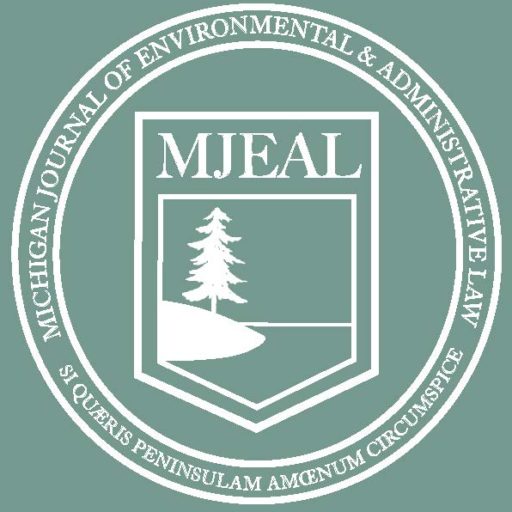Agency Delegation to External Parties: An Unexplored Challenge
Benjamin Lehman
The Supreme Court recently declined to grant cert in Texas v. Commissioner of Internal Revenue, a case from the 5th Circuit. However, three justices said the decision was driven by threshold issues of mootness and statutes of limitations, but they would grant review on the delegation issues in a future case.[1] The case revived two major questions about the constitutional limits on delegation and presents a third issue for the first time. First, the petition challenged the extent to which legislative power can be constitutionally delegated away from Congress.[2] Second, it highlighted the particular issues with governmental delegation of power to purely private entities. [3] Finally, while not presented in the initial petition, the petitioners’ reply explicitly suggested that an agency cannot delegate power outside of the federal government absent explicit authorization by Congress[4]. Because this position has not been considered by the Supreme Court before, a broad decision could cause substantial change in the regulatory landscape. Although the Supreme Court chose not to hear this case due to threshold issues, the sub-delegation question is likely to resurface until the court rules on its general permissibility.
The first two challenges pose fact-based questions refining existing distinctions from prior case law. The primary test for permissible Congressional delegation of any kind is whether Congress has articulated some “intelligible principle” to guide the delegatee in wielding the power.[5] The “intelligible principle” requirement is a very low standard, since the principle can be something as general as an instruction to allocate radio licenses “as public convenience, interest, or necessity requires”[6]. Justice Thomas has expressed interest in revisiting this line, but he appears to be alone in this desire.[7] The Supreme Court has placed more substantial limitations on delegation to private entities. The Supreme Court held in Sunshine Anthracite Coal Co. v. Adkins[8] that Congress can delegate some authority to private entities, as long as they function “subordinately to the [federal agency]”. By contrast, in Carter v. Carter Coal Co.[9], the Supreme Court invalidated a delegation because it included binding regulatory authority. The framework presented by these cases has been the rule for private delegation for over 85 years, and subsequent rulings have simply reinforced the dividing line of whether the government makes the final decision[10].
The grounding for agency delegation to private entities without explicit Congressional authorization has not been affirmed in prior Supreme Court rulings and therefore is most tenuous. While Congress has sometimes explicitly authorized or even required agencies to receive recommendations from other sources,[11] agencies occasionally delegate without explicit permission. In this case, the Centers for Medicare and Medicaid interpreted the definition of “actuarially sound” to require certification by actuaries meeting certain qualification standards set by a private organization.[12] The D.C. Circuit has prohibited agency delegation out of the federal government absent Congressional authorization[13]. This may have been motivated by a concern that the potential harm of delegation is “doubled in degree in the context of a transfer of authority from Congress to an agency and then from an agency to private individuals.”[14] The impact of a new ruling limiting delegation would vary greatly depending on the grounds for the Supreme Court’s decision. If the Court were to replace the “intelligible principle” doctrine with something substantially more stringent, all agency actions would be opened up to renewed scrutiny. If the court did bar subdelegation by agencies, there would be two major areas of impact. First, it will effectively force more blanket rules and regulations, as agencies will no longer be able to delegate significant discretion to local agencies.[15] Second, regulations may no longer be able to incorporate by reference rules created by trade organizations, as scrutiny of whether the agency may be “rubber-stamping” external decisions will be heightened.
Benjamin Lehman is a Junior Editor with MJEAL. Benjamin can be reached at benjamle@umich.edu.
[1] Texas V. Commissioner of Internal Revenue 596 U.S. ____ (2022) (Alito, J. Statement Regarding Denial of Cert).
[2] Petition for Writ of Cert. at 13, Texas V. Rettig, No. 21-379 (S.C. petition for cert. filed Sep. 3, 2021).
[3] The limit on delegation to private entities was most recently presented in Department of Transportation V. Association of American Railroads 575 U.S. 43 (2015).
[4] Reply of Petitioners at 4, Rettig, No. 21-379.
[5] J.W. Hampton, Jr.v. United States, 276 U.S. 394, 409 (1928).
[6] Federal Radio Commission v. Nelson Bros. Bond & Mortg. Co., 53 S.Ct. 627, 634 (1933).
[7] Assoc. of Am. R.R.s, 575 U.S. 43, 84-86 (2015) (J. Thomas concurring).
[8]310 U.S. 381, 399 (1940).
[9] 56 S.Ct. 855 (1936).
[10] New Motor Vehicle Board v. Orrin W. Fox Co., 439 U.S. 96, 110 (1978) (holding that it is acceptable for private complaints to be the trigger for Board Review); Hawaii Housing Authority v. Midkiff, 467 U.S. 229, (1984) (holding that private parties can initiate eminent domain proceedings).
[11] E.g. Energy Policy Act of 2005, Pub. L. No. 109-58, § 1211(a), 119 Stat. 594, 941 (codified at 16 U.S.C. § 824o (2012)) (providing that “[t]he Electric Reliability Organization shall file each reliability standard or modification to a reliability standard that it proposes to be made effective under this section with the Commission” and granting FERC the authority to approve each standard or to disapprove the standard “in whole or in part”).
[12] Petition at 6, Rettig, No. 21-379.
[13] U.S. Telecom Ass’n v. F.C.C., 359 F.3d 554, 566 (D.C. Cir. 2004) (holding that “federal agency officials … may not subdelegate to outside entities … absent affirmative evidence of authority to do so.”
[14] National Assn of Regulatory Utility Commissioners v. FCC, 737 F.2d 1095, 1143 (D.C. Cir. 1984).
[15] Supra at 12 (prohibiting the F.C.C. from providing state commissions broad discretion); Assiniboine & Sioux Tribes v. Bd. of Oil and Gas, 792 F.2d 782, 795 (9th Cir.1986).
